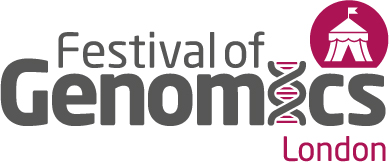We were very excited to attend the Festival of Genomics, held in London on 19th-21st of January 2016. Two days of the conference were filled with interesting workshops, stimulating presentations and inspiring people. It was a valuable opportunity for us to meet the people shaping the world of genomics industry: from bioinformaticians working in hospitals to clinicians from around the world looking for opportunities to introduce the recent advancements of bioinformatics into their practice.
Each day of the Festival started with plenary talks, delivered by leaders in the field of genomics, setting down a general tone of the discussion that day. Here are our chosen highlights of these talks:
DAY 1: Why is genomics research so important and where do we go from here.
One of the first speakers was Sir John Chisholm, Executive Chair of Genomics England. Sir John talked about making the UK a world-leader in genomics and emphasised how critical this research is. The importance of the genomics revolution taking place right now was compared to the importance of the first man walking on the moon, with Sir John stressing that the main difference between the two is that the genomics revolution will change the lives of every person in the world. Sir John Burn, Professor of Clinical Genetics from the Newcastle University, discussed the importance of looking at the whole genome and not solely focusing on exome research. He compared performing whole exome sequencing to watching only the goals from all the football matches, whilst missing the rest of the games. To illustrate his point, he used an example of Burn-McKeown syndrome (named after him), a rare condition caused by compound heterozygosity of low-frequency promoter deletions, which would be impossible to genetically diagnose using only the whole exome sequencing approach. Following these plenary talks, the first day of the conference was data-centric. Three "streams" of talks included Single Cell Analysis, Cancer Genomics and Enabling Data streams. Many speakers addressed the computational challenges of genLife Science Data analysis - same challenges that we here at Genestack are working hard to solve. You can read more about how we address the computational problems of single-cell RNA-seq here.
DAY 2: Current bottlenecks: data analysis, interpretation and most of all: clinical actions.
Plenary talks of the second day of the Festival were centered around personalised healthcare. Alex Dickinson, Senior Vice President of Illumina, talked about how bad we are at predicting the use of exponential technologies. He gave us a very interesting insight into some of the things that caught Illumina by surprise, for example the popularity of non-invasive fetal testing using cell-free DNA as well as the potential to perform liquid biopsies and hence enable very early cancer detection, using techniques very similar to NIPT. He also told us about the GRAIL project, set up by Illumina and backed, amongst others, by Bill Gates. They will be developing a simple blood test that could enable detection of any cancer type very early. If the technology really works, it could have incredible medical, societal and economic implications.
Nazheen Rahman, Professor of Human Genetics from the Institute of Cancer Research discussed if in the process of implementing genomics medicine into everyday practice we are focusing on the right things. In her talk she pointed out that sequencing used to be a rate-determining step of clinical genomics. Now, it's analysis, interpretation and clinical actions that are bottlenecks. In her talk, so also mentioned the problem of explaining the concept of risk to patients, warned us about the trap of overdiagnosis and emphasised the fact that medical genetic tests are very different from predictive genetics testing. The second day of the conference was patient-centric.
During the talks, speakers lectured us on the challenges of introducing genomics to the clinic, updated up on latest cancer genomics research advancements and talked about precision medicine in the context of drug development.
The take home message from the second day of the conference is that in order to benefit fully from the advancements of sequencing technologies we need to look at genomic medicine with a fresh eye, instead of just scaling up solutions we use at the moment. Overall, the Festival of Genomics was an incredibly fascinating event which allowed attendees to gain a broader perspective on what is going on in the world of genomics.
The next conference we'll be going to is Bio-IT conference in Boston and we can't wait! Genestack team
